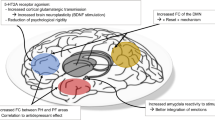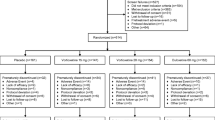Abstract
Objective
To compare the efficacy of imipramine and fluvoxamine in inpatients from two centers suffering from a depressive disorder according to DSM IV criteria.
Methods
The study included 141 patients with a depressive disorder according to DSM IV criteria. After a drug-free and placebo run-in period of 1 week, patients were randomized to imipramine or fluvoxamine; doses of both drugs were adjusted to a predefined target blood level. Efficacy was evaluated 4 weeks after attaining predefined adequate plasma level.
Results
The mean age of the study group (47 males, 94 females) was 51.8 (range 19–65) years. Of these 141 patients, 56 had episode duration longer than 1 year, 48 had mood congruent psychotic features, and 138 patients received medication. Seven patients did not complete the medication trial. The total number of patients using concurrent medication was 12/138 (8.6%). On the primary outcome criteria patients on imipramine improved significantly better on the change of illness severity score of the CGI (χ2 exact trend test=4.089, df=1, P=0.048). There was no significant difference in 50% or more reduction on the HRSD, the other primary outcome criterion. On the secondary outcome criteria the mean reduction of the HRSD scores was significantly larger in the imipramine group than in the fluvoxamine group (mean difference=3.1, standard error (SE)=1.4, t=2.15, df=136, P=0.033). There was no significant difference in the number of patients with an HRSD ≤7 at the final evaluation.
Conclusions
In depressed inpatients imipramine is more efficacious than fluvoxamine. Both drugs were well tolerated by all patients.


Similar content being viewed by others
References
Amore M, Bellini M, Berardi D, Berlinzani L, Cervino G, Cremonini A, Ferrari G, Innamorati A (1989) Double-blind comparison of fluvoxamine and imipramine in depressed patients. Curr Ther Res 46:815–820
Anderson IM (2000) Selective serotonin reuptake inhibitors versus tricyclic antidepressants: a meta-analysis of efficacy and tolerability. J Affect Disord 58:19–36
Anderson IM, Nutt DJ, Deakin JF (2000) Evidence-based guidelines for treating depressive disorders with antidepressants: a revision of the 1993 British Association for Psychopharmacology guidelines. J Psychopharmacol 14:3–20
Angst J (1993) Severity of depression and benzodiazepine co-medication in relationship to efficacy of antidepressants in acute trials. Hum Psychopharmacol 401–407
Benkert O, Szegedi A, Wetzel H (1996) Minimum effective dose for antidepressants—an obligatory requirement for antidepressant drug evaluation? Int Clin Psychopharmacol 11:177–185
Bollini P, Pampallona S, Tibaldi G, Kupelnick B, Munizza C (1999) Effectiveness of antidepressants. Meta-analysis of dose-effect relationships in randomised clinical trials. Br J Psychiatry 174:297–303
Bruijn JA, Moleman P, Mulder PG, van den Broek WW, van Hulst AM, van der Mast RC, van de Wetering BJ (1996) A double-blind, fixed blood-level study comparing mirtazapine with imipramine in depressed in-patients. Psychopharmacology127:231–237
Claghorn JL, Earl CQ, Walczak DD, Stoner KA, Wong LF, Kanter D, Houser VP (1996) Fluvoxamine maleate in the treatment of depression: a single-center, double-blind, placebo-controlled comparison with imipramine in outpatients. J Clin Psychopharmacol 16:113–120
Dominguez RA, Goldstein BJ, Jacobson AF, Steinbook RM (1985) A double-blind placebo-controlled study of fluvoxamine and imipramine in depression. J Clin Psychiatry 46:84–87
DUAG (1986) Citalopram: clinical effect profile in comparison with clomipramine. A controlled multicenter study. Danish University Antidepressant Group. Psychopharmacology 90:131–138
DUAG (1990) Paroxetine: a selective serotonin reuptake inhibitor showing better tolerance, but weaker antidepressant effect than clomipramine in a controlled multicenter study. Danish University Antidepressant Group. J Affect Disord 18:289–299
Fabre L, Birkhimer LJ, Zaborny BA, Wong LF, Kapik BM (1996) Fluvoxamine versus imipramine and placebo: a double-blind comparison in depressed patients. Int Clin Psychopharmacol 11:119–127
Feighner JP, Boyer WF, Meredith CH, Hendrickson GG (1989) A placebo-controlled inpatient comparison of fluvoxamine maleate and imipramine in major depression. Int Clin Psychopharmacol 4:239–244
Foglia JP, Perel JM, Nathan RS, Pollock BG, Lin FC, Nerayanan S (1990) Therapeutic drug monitoring (TDM) of fluvoxamine, a selective antidepressant. Clin Chem 36:1043
Glassman AH, Perel JM, Shostak M, Kantor SJ, Fleiss JL (1977) Clinical implications of imipramine plasma levels for depressive illness. Arch Gen Psychiatry 34:197–204
Guelfi JD, Dreyfus JF, Pichot P (1983) A double-blind controlled clinical trial comparing fluvoxamine with imipramine. Br J Clin Pharmacol 15:411S–417S
Guy W (1976) Assessment manual for psychopharmacology. US Department of Healthy Education and Welfare
Guy W, Wilson WH, Ban TA, King DL, Manov G, Fjetland OK (1984) A double-blind clinical trial of fluvoxamine and imipramine in patients with primary depression. Psychopharmacol Bull 20:73–78
Hamilton M (1960) A rating scale for depression. J Neurol Neurosurg Psychiatry 23:56–61
Hartter S, Wetzel H, Hammes E, Torkzadeh M, Hiemke C (1998) Nonlinear pharmacokinetics of fluvoxamine and gender differences. Ther Drug Monit 20:446–449
Hirschfeld RM (1999) Efficacy of SSRIs and newer antidepressants in severe depression: comparison with TCAs. J Clin Psychiatry 60:326–335
Itil TM, Shrivastava RK, Mukherjee S, Coleman BS, Michael ST (1983) A double-blind placebo-controlled study of fluvoxamine and imipramine in out-patients with primary depression. Br J Clin Pharmacol 15:433S–438S
Kasper S, Moller HJ, Montgomery SA, Zondag E (1995) Antidepressant efficacy in relation to item analysis and severity of depression: a placebo-controlled trial of fluvoxamine versus imipramine. Int Clin Psychopharmacol 9:3–12
Lapierre YD, Browne M, Horn E, Oyewumi LK, Sarantidis D, Roberts N, Badoe K, Tessier P (1987) Treatment of major affective disorder with fluvoxamine. J Clin Psychiatry 48:65–68
Lingam R, Scott J (2002) Treatment non-adherence in affective disorders. Acta Psychiatr Scand 105:164–172
Lydiard RB, Laird LK, Morton WA Jr, Steele TE, Kellner C, Laraia MT, Ballenger JC (1989) Fluvoxamine, imipramine, and placebo in the treatment of depressed outpatients: effects on depression. Psychopharmacol Bull 25:68–70
March JS, Kobak KA, Jefferson JW, Mazza J, Greist JH (1990) A double-blind, placebo-controlled trial of fluvoxamine versus imipramine in outpatients with major depression. J Clin Psychiatry 51:200–202
Nair NP, Bakish D, Saxena B, Amin M, Schwartz G, West TE (1996) Comparison of fluvoxamine, imipramine, and placebo in the treatment of outpatients with panic disorder. Anxiety 2:192–198
Niklson IA, Reimitz PE, Sennef C (1997) Factors that influence the outcome of placebo-controlled antidepressant clinical trials. Psychopharmacol Bull 33:41–51
Norton KR, Sireling LI, Bhat AV, Rao B, Paykel ES (1984) A double-blind comparison of fluvoxamine, imipramine and placebo in depressed patients. J Affect Disord 7:297–308
Prudic J, Haskett RF, Mulsant B, Malone KM, Pettinati HM, Stephens S, Greenberg R, Rifas SL, Sackeim HA (1996) Resistance to antidepressant medications and short-term clinical response to ECT. Am J Psychiatry 153:985–992
Roose SP, Glassman AH, Attia E, Woodring S (1994) Comparative efficacy of selective serotonin reuptake inhibitors and tricyclics in the treatment of melancholia. Am J Psychiatry 151:1735–1739
Sackeim HA, Prudic J, Devanand DP, Decina P, Kerr B, Malitz S (1990) The impact of medication resistance and continuation pharmacotherapy on relapse following response to electroconvulsive therapy in major depression. J Clin Psychopharmacol 10:96–104
Spigset O, Martensson B (1999) Fortnightly review: drug treatment of depression. BMJ 318:1188–1191
Spitzer R, Endicot J (1978) Schedule for affective disorders and schizofrenia (SADS), 3rd edn. Biometric Research, New York State Psychiatric Institute, New York
Walczak DD, Apter JT, Halikas JA, Borison RL, Carman JS, Post GL, Patrick R, Cohn JB, Cunningham LA, Rittberg B, Preskorn SH, Kang JS, Wilcox CS (1996) The oral dose-effect relationship for fluvoxamine: a fixed-dose comparison against placebo in depressed outpatients. Ann Clin Psychiatry 8:139–151
Ware MR (1997) Fluvoxamine: a review of the controlled trials in depression. J Clin Psychiatry 58:15–23
Zohar J, Keegstra H, Barrelet L (2003) Fluvoxamine as effective as clomipramine against symptoms of severe depression: results from a multicentre, double-blind study. Hum Psychopharmacol 18:113–119
Acknowledgements
This study was supported by an unconditional grant from Solvay Pharma, The Netherlands, the manufacturer of fluvoxamine. We also thank the pharmacy department of the Erasmus MC for the preparation of the medication and the determination of the plasma levels and assistance in dosing the antidepressants.
Author information
Authors and Affiliations
Corresponding author
Rights and permissions
About this article
Cite this article
van den Broek, W.W., Birkenhäger, T.K., Mulder, P.G.H. et al. A double-blind randomized study comparing imipramine with fluvoxamine in depressed inpatients. Psychopharmacology 175, 481–486 (2004). https://doi.org/10.1007/s00213-004-1853-3
Received:
Accepted:
Published:
Issue Date:
DOI: https://doi.org/10.1007/s00213-004-1853-3




